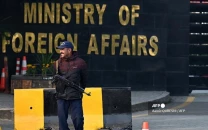Sri Lanka urged to halt deportation of Pakistani asylum seekers
142 Pakistanis belonging to minority communities detained and will possibly be deported, says HRW

Sri Lanka urged to halt deportation of Pakistani asylum seekers
During police raids in June 2014 in Sri Lanka, roughly 142 Pakistanis belonging to minority communities, were detained and will possibly be deported, HRW said in a report.
The detained Pakistanis fled to Sri Lanka in search of asylum since they belong to minority communities, including Ahmedis, Shias and Christians.
The UN refugee agency (UNHCR) has not been given access to the detainees, who are being held in the Boosa detention center.
HRW has requested that UNHCR be given complete access to the detained people and fully understand their need for asylum before deporting them.
HRW insisted that until UN refugee agency studies the needs of those detained, the Sri Lankan controller general of immigration should not go ahead with deportation process.
Immigration Controller Chulananda Perera said that the government can deport the detained Pakistanis because they were not given permission to register asylum claims, media reports said.
“Sri Lankan authorities are threatening Pakistani minority group members with deportation at the very time when persecution of these groups is escalating in Pakistan,” said Bill Frelick, HRW's refugees director.
“Preventing asylum seekers from lodging claims in no way absolves Sri Lanka from its duty not to return them to possible persecution.”
He further said, “Sri Lankan authorities should know that Pakistan fails to protect its minority communities from persecution, Sri Lanka must honor its international obligations, and allow UNHCR access to ensure that no detainee is deported to face the risk of persecution or torture.”
As per the principle of nonrefoulement in international law, governments cannot forcibly deport refugees back to their original places where they would be at severe risk of persecution or other serious harm, the report claimed.
Authorities claimed the reason behind the arrests, which began on June 9 in the city of Negombo, was due to security concerns.
UNHCR has 1,500 refugee claims of Pakistanis registered in Sri Lanka as of 2013, the report added.
Minority communities in Pakistan have been under grave danger and have witnessed several devastating attacks.
Attacks on Shias
Attacks against Pakistan’s Shia community have been on the rise since the 1980s, but targeted killings reached unprecedented levels in 2013, with some 700 Shias murdered.
In a recent attack on Shias, nearly two dozen people were killed and many more injured in a suicide attack on a hotel hosting Shia pilgrims in Taftan, a district on the border with Iran on June 9.
Attacks on Ahmadis:
A member of the Jamaat-e-Ahmadiyya was shot dead in Chenab Nagar on May 26, allegedly because of his faith.
On occasions, members of Ahmadi community have also been prohibited from doing business. In August 2013, a man, living in Lahore, was forced to abandon his woodworking business and flee Gujranwala with his family after his erstwhile friends and neighbours discovered that he was an Ahmadi.
Attack on Christians:
On September 22, 2013, a twin suicide bombing killed at least 78 people at a church service in Peshawar. It is believed to be the country’s deadliest attack on Christians.



















COMMENTS
Comments are moderated and generally will be posted if they are on-topic and not abusive.
For more information, please see our Comments FAQ